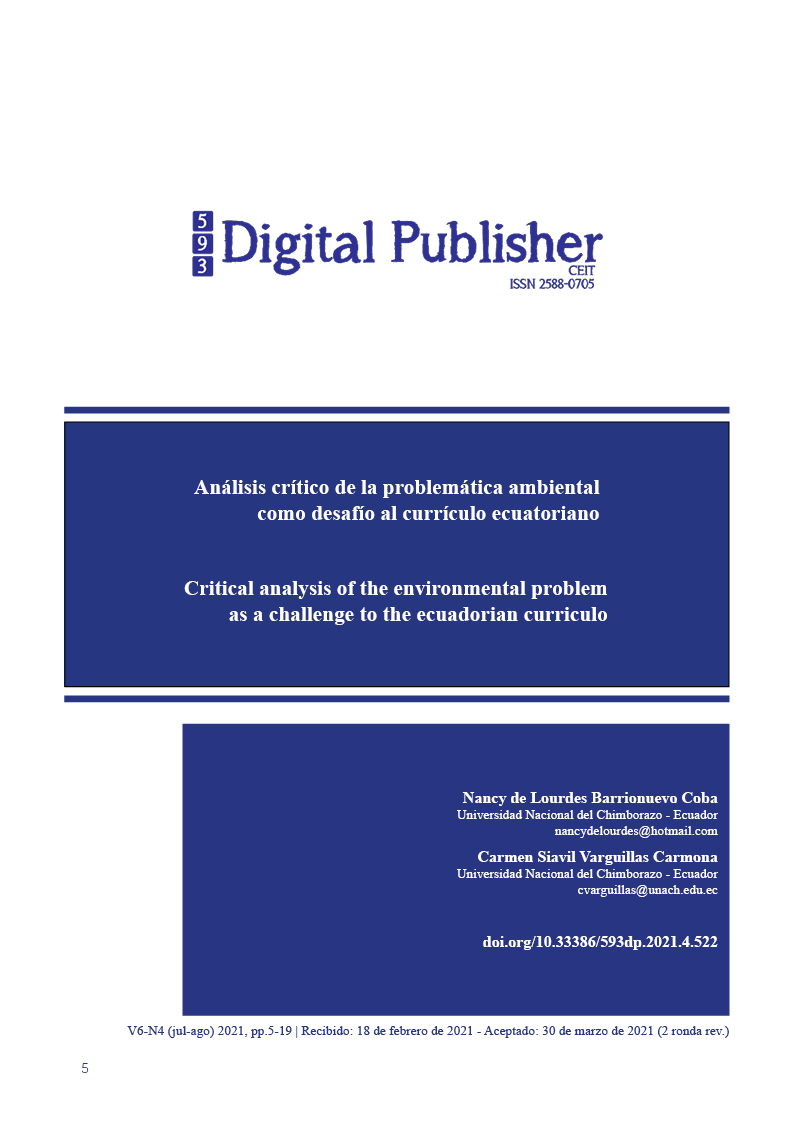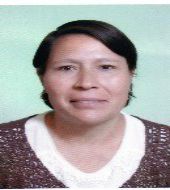Critical analysis of the environmental problem as a challenge to the ecuadorian curriculo
Main Article Content
Abstract
Attention to environmental issues by the education system in Ecuador has been lacking, if not null, on the contrary, this problem has been ignored to such an extent that modern societies are losing that human attitude of coexistence with their natural surroundings, characterized by the enlightment as rationality. At this juncture we educational people should begin to analyze the currículo of EGB and BGU in the area of Natural Sciences, where this issue should be taken into further account in order to give it the importance it increasingly deserves. Raising awareness and empathy in students towards the environment and its destruction is thus an urgent task. So much so that our suggestion is to promote guidance that encourages reflection in the education community on the environmental damage and its very negative consequences for mankind and earth itself as a complementary topic in the natural sciences´ field of Ecuadorian currículo. The methodology of this work is framed in the theoretical method since it deals with information researched, collected and verified worldwide, especially from Europe and the United States, places where they have reflected on and followed this environmental problem the furthest .As a result of all the information compiled, it has been observed that due to the excessive consumerism of modern societies tons of garbage in the billions are being generated, causing unprecedented pollution against the environment, with this it can be concluded that Ecuador´s public administrations should focus specifically on an education more centered on caring for the environment in order to protect and preserve the future of our new generations
Downloads
Article Details

This work is licensed under a Creative Commons Attribution-NonCommercial-ShareAlike 4.0 International License.
1. Derechos de autor
Las obras que se publican en 593 Digital Publisher CEIT están sujetas a los siguientes términos:
1.1. 593 Digital Publisher CEIT, conserva los derechos patrimoniales (copyright) de las obras publicadas, favorece y permite la reutilización de las mismas bajo la licencia Licencia Creative Commons 4.0 de Reconocimiento-NoComercial-CompartirIgual 4.0, por lo cual se pueden copiar, usar, difundir, transmitir y exponer públicamente, siempre que:
1.1.a. Se cite la autoría y fuente original de su publicación (revista, editorial, URL).
1.1.b. No se usen para fines comerciales u onerosos.
1.1.c. Se mencione la existencia y especificaciones de esta licencia de uso.
References
A. Marcos. (2017). Unos 8.300 millones de toneladas de plástico circulan por el mundo. SINC, 3.
Acaria. (2017). Educación Ecosocial. FUHEM, 383.
BBC. (08 de 07 de 2019). Crisis mundial de la basura. Obtenido de Crisis mundial de la basura: https://www.bbc.com/mundo/noticias-48914734
BM. (30 de Marzo de 2019). Crecimiento de la población. Obtenido de Crecimiento de la población: https://www.latercera.com/mundo/noticia/crecimiento-la-poblacion-global-inicio-eventual-declive/593760/
Boisvert, J. (2004). La formación del Pensamiento Crítico. México: Printed in México.
Bordehore. (20 de Junio de 2005). César Bordehore. Obtenido de ResearchGate: https://www.researchgate.net/publication/233387315_C_Bordehore_PROBLEMAS_AMBIENTALES_PROBLEMAS_HUMANOS_Chapter_in_Sociologia_Ambiental_Antonio_Aledo_and_Jose_Andres_Dominguez_Grupo_Editorial_Universitario_462_pp_Complete_book_at_httpwwwuaespersonalant
Camilloni, A. (2001). Aportes para un cambio curricular. Argentina.
Chomsky. (s.f.).
Chomsky, N. (2010). La (des)educación. Barcelona: Crítica.
Constitución de la República del Ecuador. (2008). Artículo 14 [Capítulo II ] Segunda sección. Quito: Asamblea Constituyente.
Contitutción de la República. (2008). Artículo 14. Quito: Asamblea Constituyente.
Dominique. (2002). Economía y ecología. Quito: Abya Yala.
EEB. (25 de 09 de 2019). Periódico público.es. Obtenido de La obsolescencia programada provoca 48 millones de toneladas de CO2 al año: https://www.publico.es/sociedad/obsolescencia-programada-provoca-48-millones-toneladas-co2-ano.html
EFE. (25 de Mayo de 2016). EFEVerde. Obtenido de ONU Medio Ambiente: https://www.efeverde.com/noticias/producir-alimentos-causa-60-perdida-biodiversidad-unea2/
El Atlas. (1995). Monde Diplomatique. Valencia: Generalitat Valencana.
EL MUNDO. (28 de 06 de 2016). Millones de toneladas de comida se desperdician. Obtenido de Alimentación: https://www.elmundo.es/sociedad/2016/06/28/57725079ca474104478b4627.html
El país. (01 de 09 de 2018). Pablo Linde. Obtenido de Pablo Linde: https://elpais.com/elpais/2018/08/29/planeta_futuro/1535575652_076292.html
El país. (01 de 09 de 2018). Por qué sabemos que los humanos causamos el cambio climático. Obtenido de Por qué sabemos que los humanos causamos el cambio climático: https://elpais.com/elpais/2018/08/29/planeta_futuro/1535575652_076292.html
EL PAÍS. (22 de 05 de 2019). El cáncer que acecha a Monsanto. Obtenido de Medio Ambiente: https://elpais.com/sociedad/2019/05/18/actualidad/1558174161_198674.html
EUROPAPRESS. (14 de 01 de 2020). Identifican causas del cambio climático. Obtenido de Identifican causas del cambio climático: https://www.europapress.es/ciencia/habitat-y-clima/noticia-identifican-causas-cambios-climaticos-multidecadales-20190725102123.html
FAO. (28 de 11 de 2017). Ganadería y deforestación. Obtenido de Políticas pecuarias: http://www.fao.org/3/a-a0262s.pdf
FAQUAE. (12 de 06 de 2020). Fundación Aquae. Obtenido de Recursos: https://www.fundacionaquae.org/que-son-recursos-renovables/
FEM. (13 de 10 de 2016). Foro Económico Mundial. Obtenido de Cuál es el rol de la educación en las economías modernas: https://es.weforum.org/agenda/2016/10/cual-es-el-rol-de-la-educacion-en-las-economias-modernas/
Garcia. (2016). Artículo verde. Infancia y Educación, 6.
Geenpeace. (15 de 03 de 2018). Como afecta el consumismo al medio ambiente. Obtenido de Greenpeace: https://es.greenpeace.org/es/wp-content/uploads/sites/3/2018/03/bueno-informe.pdf?_ga=2.48719971.496099748.1602726768-2132566512.1588560794
GREENPEACE. (01 de 04 de 2020). Concentración de CO2 en la atmósfera sigue creciendo. Obtenido de Actualidad: https://es.greenpeace.org/es/sala-de-prensa/comunicados/la-concentracion-de-co2-en-la-atmosfera-sigue-creciendo-a-pesar-de-las-medidas-tomadas-por-la-crisis-sanitaria/
Hernández. (2007). La ética kantiana de la responsabilidadcon la naturaleza. Revista de Filosofía Moral y Política, 24.
Icaria. (26 de 04 de 2007). Defendiendo la ecología. Obtenido de Webedia: https://www.xatakaciencia.com/otros/definiendo-la-ecologia
J. Navallo, T. (1989). Historia de la Filosofía. Madrid: Anaya.
J.Boisvert. (2004). La formación del pensamiento crítico. México: Fondo de Cultura Económica.
Lopez, R. M. (2005). Estado del mundo. España: Akal.
MAE. (13 de 03 de 2017). Proyecto paisajes y vida silvestre. Obtenido de Proyecto paisajes y vida silvestre: https://www.youtube.com/watch?v=yclu8gyI08E&feature=youtu.be
Mar Romera. (10 de 04 de 2019). Educación 3.0. Obtenido de Líder en innovación educativa: https://www.educaciontrespuntocero.com/entrevistas/mar-romera-la-escuela-que-quiero/?fbclid=IwAR2cbSIUeXQ8kSFote4mXWgXbGlduGpoENjhNNlfRbZOlc8rVVjCpSYPEc4
May Modern Met . (08 de 11 de 2019). Medio ambiente. Obtenido de Medio ambiente: https://mymodernmet.com/es/italia-educacion-cambio-climatico/
Mayer, F. (1967). Historia del Pensamiento Pedagógico. Buenos Aires: Kpelusz.
MINEDUC. (17 de 02 de 2019). Currículo. Obtenido de Currículo de EGB y BGU: https://educacion.gob.ec/wp-content/uploads/downloads/2016/03/Curriculo1.pdf
N. Chomsky. (2010). La Deseducación. Barcelona: Crítica.
OMS. (15 de marzo de 2016). Organización Mundial de la Salud. Obtenido de Comunicado de prensa: https://www.who.int/es/news-room/detail/15-03-2016-an-estimated-12-6-million-deaths-each-year-are-attributable-to-unhealthy-environments
OMS. (15 de 03 de 2016). Salud ambiental. Obtenido de https://www.who.int/es/news-room/detail/15-03-2016-an-estimated-12-6-million-deaths-each-year-are-attributable-to-unhealthy-environments
ONU. (08 de 10 de 2018). Calentamiento global 1,5ºC. Obtenido de IPCC: https://www.ipcc.ch/sr15/
ONU. (25 de octubre de 2018). Derechos Humanos. Obtenido de Noticias ONU: https://news.un.org/es/story/2018/10/1444342
ONU. (2018). Resolución aprobada. Rio de Janeiro: Asamble General.
ONU. (2019). Creciendo a un ritmo menor, se espera que la población mundial alcanzará. New York: United Nations Department of Public Information.
ONU. (01 de 12 de 2019). OMM. Obtenido de Noticias ONU: https://news.un.org/es/story/2019/12/1466081
ONU. (04 de Marzo de 2019). Perspectivas Mundial del Medio Ambiente. Obtenido de GEO: https://www.unenvironment.org/es/resources/perspectivas-del-medio-ambiente-mundial-6
ONU. (06 de 12 de 2020). Noticias. Obtenido de Conflictos y recursos naturales: https://peacekeeping.un.org/es/conflict-and-natural-resources
ONU. (15 de 09 de 2020). Programa para el medio ambiente. Obtenido de La humanidad en una encrucijada por el futuro de la naturaleza: https://www.unenvironment.org/es/noticias-y-reportajes/comunicado-de-prensa/la-humanidad-en-una-encrucijada-por-el-futuro-de-la
Otero, A. R. (2001). Medio Ambiente y Educación. Argentina: Novedades educativas.
ResearchGate. (26 de 11 de 2019). wordl scientistts warning of a climate emergency. Obtenido de wordl scientistts warning of a climate emergency: https://www.researchgate.net/publication/337534374_World_Scientists’_Warning_of_a_Climate_Emergency
Roth, E. (2000). Psicología Ambiental: Interfase entre conducta y naturaleza. Universidad Católica Bolivariana, 78.
Salinas, D. (1994). Qué es eso llamado curriculum? En D. Salinas, Curriculum, racionalidad y discurso didáctico (pág. 10). Valencia.
Sierra, J. F. (1992). Evaluación del Currículum: Perspectivas curriculares y enfoques en su evaluación. Ludgren.
SOITU:ES. (27 de 06 de 2008). Medio Ambiente. Obtenido de Medio Ambiente: http://www.soitu.es/soitu/2008/06/27/medioambiente/1214558665_374185.html
T. Libaert. (2014). Por un consumo más sostenible. CESE, 23.
T.Colborn. (2002). Nuestro futuro robado. Madrid: EcoEspaña.
Thierry LIBAERT. (2014). Por un consumo más sostenible. CESE, 23.
WEFORUM. (22 de 06 de 2015). World Economic Forum. Obtenido de Los BRICS detienen su auge: https://es.weforum.org/agenda/2015/06/los-brics-detienen-su-auge/



